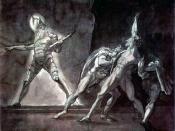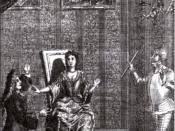To Be Shakespeare, Or Not To Be Shakespeare,
That Is The Question
Kenneth Branaugh may have had the script of William Shakespeare's Hamlet spoken down to every last thee and thou, but one must remember that this is Hamlet through Branaugh's eyes, not Shakespeare's. Therefore, dismissing obvious additions made for adapting the play to film, such as having a real castle instead of a stage, it is possible to observe the unique characters, interpretations, actions, and setting that make this version the director's own.
In the time of Shakespeare, one of the actors main challenges was to use the words to paint the scene for the audience, since, for the most part, they were looking at a bare stage. However, this use of imagination and portrayal is no longer needed when the script is brought to film. Every pearl and snowflake have been placed strareview of Kenneth Branaugh's Hamlet witty, and quick
tegically before the audience, so that there is no need to listen to the language to create your own vision of Hamlet's world.
Branaugh's world is full of lavish affairs, freezing winters, and halls of mirrors. The use of the camera has some definite advantages and disadvantages. First, since the characters are no longer limited by a defined space, they are able to delivereview of Kenneth Branaugh's Hamlet witty, and quick
r their long speeches while being in a constant state of motion. This occurs in the scene with the guards, and most noticeably in the scene with Laertes and Ophelia, before he leaves for France. This same scene demonstrates how the camera enreview of Kenneth Branaugh's Hamlet witty, and quick
ables the characters to switch from one setting to the next, as when Laertes, Ophelia, and Polonius are taken from outside to the church.


